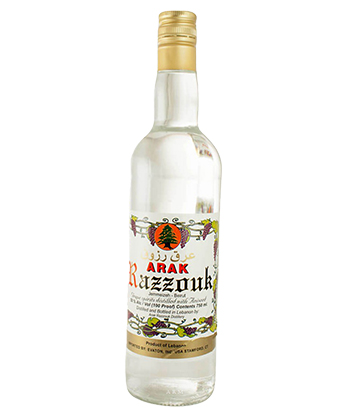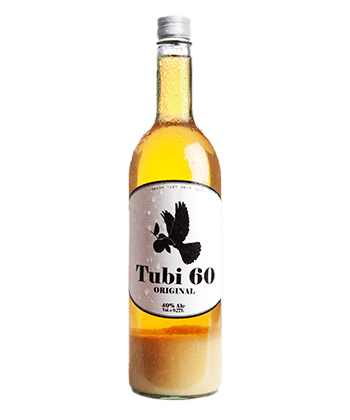Arak, the clear, anise-flavored liquor category known for its palate-cleansing abilities, has been gracing dinner tables throughout the Levant and beyond for many centuries. Its refreshing profile makes it the perfect complement to the region’s traditional mezze — a smorgasbord of spices and textures presented as small plates.
Tubi 60, a 21st-century herbal spirit brand that first garnered a very enthusiastic following in Tel Aviv, has gone on to become a permanent fixture in Israeli bars and nightclubs. Fans praise the spirit for its seemingly euphoric side effects and its lack of hangover symptoms — maintaining an air of mystery as the spirit’s founders remain mum on its exact recipe.
Today, Tubi 60 is available in a handful of European countries and since its launch has been making its way across the U.S., while arak can be found in liquor stores in most states. Read on to learn more about how these two potent beverages, one ancient and the other modern, match up.
Origin
From Greece’s beloved ouzo, Turkish raki, anisette in Italy, and pastis in France, anise-based spirits are enjoyed across the globe. While arak’s exact origin is ambiguous, many consider it to be the world’s oldest distilled spirit, developed by the Arabs around the 12th century. In Lebanon, where the beloved spirit is known as “lions’ milk,” arak is regarded as the national drink.
On the other hand, Tubi 60 didn’t enter the Israeli scene until 2013 after brothers Hilal and Yanai Tubi created the product in their parents’ Haifa apartment. Eventually, the product’s success inspired the duo to move their operation to a much larger facility, also in Haifa. In 2017, the company expanded its sales to Europe and the U.S.
Flavor
Unlike some anise-based spirits, which may use a medley of botanicals, arak is unsweetened and flavored only with aniseed. Each producer’s recipe differs, but the liquor can be quite complex with notes of black licorice, fennel, mint, caraway, peppermint, and hints of flowers and fruit.
Tubi garners strong opinions — a love-it-or-hate-it reputation with comparisons to limoncello, arak spiked with gin and tea, and even dish soap. In a YouTube video, Shaun Meglen a former bar manager at Austin’s Péché, explains that Tubi 60 is unlike anything he’s tasted: “aggressive, spicy, citrusy,” and akin to a “boozy kombucha,” while shaking up a summery beverage that combines the spirit with muddled jalapeño, simple syrup, lime, grapefruit juice, and a splash of Topo Chico.
Production
At 80 proof, Tubi’s exact recipe remains a secret, though it begins as a corn-based distillate to which macerated whole lemons, ginger, turmeric, cumin, mint, and saffron are later added. The company also touts the product as all-natural, vegan, gluten-free, and certified kosher.
Made by distilling fermented grape juice and fresh green aniseed often sourced from Syria, arak’s alcohol content can range, but most bottles tend to fall between 80 proof and 100 proof. In Lebanon, arak producers — often winemakers — use the native white grapes Obeidi and Merwah, and age the spirit for at least one year in clay jugs. Some allow the spirit to rest even longer, as long as five years, resulting in a smoother mouthfeel.
Cocktails
Arak is often diluted with water, resulting in a milky-white appearance known as the “louche” effect. It is then served poured into small glasses filled with ice. The ratio of water depends on your taste, but one-third arak to two-thirds water is a traditional mix.
There are many inventive applications for arak in cocktails. At Suraya, a Lebanese restaurant and market in Philadelphia, arak makes an appearance in several mixed drinks. In one cocktail, named “Seek the Ether,” arak is combined with tequila, Aperol, Cocchi Rosa, and dried Turkish chili pepper. The “Golden Belt” showcases the spirit with gin, Scotch, Japanese whisky, burnt honey, turmeric, and coriander.
In addition to Meglen’s Tubi 60 cocktail “Fresh Clippings,” Tubi can be served as a shot, over ice with tonic water, or even as a slushie. Because the product is unfiltered, each bottle comes with a good amount of sediment at the bottom, so it’s best to shake before drinking and serve chilled.


